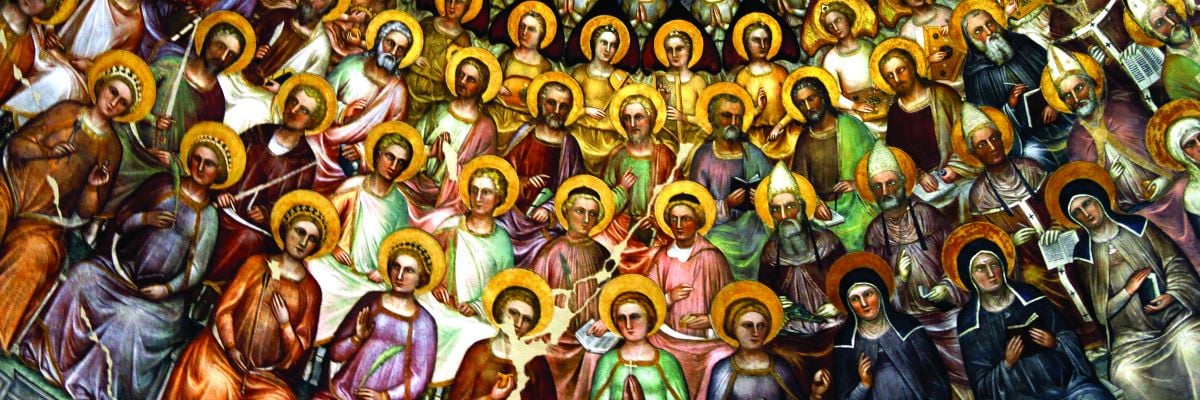
The Catechism teaches that “the life of each of God’s children is joined in Christ and through Christ in a wonderful way to the life of all the other Christian brethren in the supernatural unity of the Mystical Body of Christ, as in a single mystical person” (1474).
This belief comes from Paul’s teaching in the twelfth chapter of his first letter to the Corinthians. He compares the unity that Christians have with Christ and with each other to a body: “For just as the body is one and has many members, and all the members of the body, though many, are one body, so it is with Christ. For by one Spirit we were all baptized into one body” (1 Cor. 12:12-13). He concludes, “Now you are the body of Christ and individually members of it” (v. 27).
This communion that members of Christ’s mystical body have with each other isn’t restricted to members on Earth. It extends to those souls that are perfected in heaven. We know this because Paul teaches that death cannot separate us from Christ: “Who shall separate us from the love of Christ? Shall tribulation, or distress, or persecution, or famine, or nakedness, or peril, or sword?” (Rom. 8:35).
The love of Christ dwelling within our hearts is what makes us members of Christ’s mystical body. So, if death can’t separate us from that love, it follows that death can’t separate us from the mystical body of Christ. In other words, a Christian doesn’t cease being a member of Christ’s mystical body at the moment of death.
From this it follows that all souls in heaven are still members of the mystical body of Christ. In fact, they’re perfected members, because they no longer have sin nor struggle with the temptations of sin.
This is the basis of the Church’s teaching that the saints in heaven can intercede for us:
Being more closely united to Christ, those who dwell in heaven fix the whole Church more firmly in holiness. . . .[T]hey do not cease to intercede with the Father for us, as they proffer the merits which they acquired on earth through the one mediator between God and men, Christ Jesus (CCC 956).
The scriptural testimony for this belief is found in Revelation 5:8:
And when he [“a lamb standing, as though it had been slain”—v. 6] had taken the scroll, the four living creatures [possibly angels or representations of the Gospel authors] and the twenty-four elders fell down before the Lamb, each holding a harp, and with golden bowls full of incense, which are the prayers of the saints.
Revelation 4:4 describes the elders as sitting on thrones, which indicates they are “those to whom judgment was committed” (Rev. 20:4). And since “those to whom judgment was committed” is listed among “the souls of those who had been beheaded for their testimony,” we know John is referring to human souls that make up the Church triumphant.
The “prayers of the saints” is a reference to the prayers of Christians on Earth. So, if the blessed in heaven are offering the prayers to Jesus of Christians on Earth, then it’s reasonable to make our prayer requests known to them.
Some Protestants might object that doing so undermines the unique mediation of Christ, since he is the “one mediator between God and man” (1 Tim. 2:5). But the intercessory prayer of the blessed in heaven isn’t exercised apart from Christ’s unique mediation, as if it were by their own power. As members of Christ’s mystical body, their intercessory prayer is a participation in Christ’s unique mediation. Consequently, their intercessory prayers no more undermine Christ’s unique mediation than Christians on Earth interceding for other living Christians.
Some Protestants also object to the Catholic practice of asking the saints to pray for us because they perceive such a practice as a violation of the Bible’s prohibition of necromancy in Deuteronomy 18:10-11. But necromancy is communication with the dead in order to obtain hidden or secret knowledge beyond our ordinary human powers, whether about the future or current events. There are two reasons why we know eliciting secret knowledge from the dead is what Deuteronomy 18:10-11 has in mind.
First, the same verses also forbid “divination,” and seeking a “medium,” a “sorcerer,” and a “wizard,” all of which have to do with an attempt to gain knowledge beyond ordinary human intelligence.
Second, the subsequent instruction that Moses gives concerns a coming prophet. In verse fifteen, Moses says, “The Lord your God will raise up for you a prophet like me from among you, from your brethren—him you shall heed” (emphasis added). In other words, there is no need to go to mediums, sorcerers, wizards, and necromancers to gain knowledge, because God will send a prophet of his own.
The Catholic practice of requesting the saints in heaven to pray for us simply doesn’t fit the bill as necromancy. There is no request for a transmission of information from the dead to the living. In fact, the flow of information is reversed. It’s the living who make their requests known to the “dead,” who are really those who are alive in Christ.



